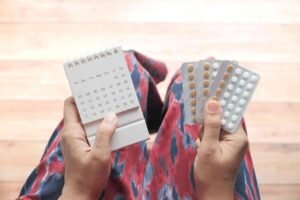How Birth Control Affects Body Beyond Pregnancy Prevention?
When most people think about birth control, they immediately associate it with pregnancy prevention. And while that’s its primary purpose, hormonal birth control does a lot more than just stop you from getting pregnant. From affecting your mood to changing your skin, birth control impacts different systems in your body in ways you might not have expected.
If you’ve ever wondered how birth control affects your body beyond just preventing pregnancy, you’re in the right place. Let’s dive into the science and everyday experiences that come with hormonal contraceptives.
How Does Birth Control Work?
Before we get into the effects, let’s quickly cover how birth control works. Hormonal birth control methods—like the pill, patch, ring, shot, and some IUDs—alter your body’s natural hormonal balance. Most contain synthetic versions of estrogen and/or progestin, which:
- Prevent ovulation (so there’s no egg to fertilize)
- Thicken cervical mucus to block sperm
- Thin the uterine lining to make implantation less likely
These changes don’t just stop pregnancy—they influence various bodily functions, which is why some people experience noticeable changes in their health and well-being.

How Birth Control Affects Your Body Beyond Pregnancy Prevention?
1. Your Skin Might Thank You
If you’ve ever been prescribed birth control for acne, you’re not alone. Certain types of birth control, particularly those containing both estrogen and progestin, can help clear up acne by reducing androgens (hormones that stimulate oil production in the skin). This results in fewer breakouts and smoother skin.
However, not all birth control works this way. Some progestin-only options can actually make acne worse, so it’s important to talk to your doctor if skin concerns are a factor in your choice.
2. It Can Help Regulate Your Periods
One of the biggest perks of hormonal birth control is cycle regulation. If you have irregular, heavy, or painful periods, birth control can make them more predictable and manageable. By controlling ovulation and hormone fluctuations, many people experience lighter, more regular cycles.
For some, birth control eliminates periods altogether (especially with continuous-use pills or hormonal IUDs). This can be a game-changer for those who struggle with period-related pain or conditions like endometriosis.
3. Mood Swings: The Good, The Bad, and The Unpredictable
Hormones and mood go hand in hand, and birth control can impact your mental health in different ways. Some people report feeling more emotionally stable, while others experience mood swings, anxiety, or even depression.
Research suggests that progestin-only birth control methods (like the mini-pill or shot) may have a higher risk of causing mood changes compared to combination pills. If you notice a shift in your mental health after starting birth control, it’s worth discussing alternative options with your doctor.

4. Your Libido May Change
Hormonal birth control can affect libido in surprising ways. Some people find that their sex drive decreases due to changes in hormone levels, while others experience the opposite effect because they no longer have to worry about unplanned pregnancy.
If birth control is negatively impacting your libido, switching to a different formulation or method might help restore balance.
5. Migraines and Headaches: A Potential Side Effect
For those prone to migraines, birth control can either be a trigger or a remedy. Estrogen-containing birth control methods can worsen migraines in some people, especially if they’re already prone to hormonal headaches.
On the flip side, others experience fewer headaches while on birth control because of the consistent hormone levels it provides. If you have a history of migraines, it’s important to choose a birth control method that aligns with your needs.

6. Birth Control Can Impact Your Weight—But Not Always in the Way You Think
There’s a common myth that birth control causes weight gain. While some individuals notice slight changes in their weight, studies show that most forms of birth control don’t directly lead to significant weight gain.
7. Reduced Risk of Certain Cancers (And a Slight Increase in Others)
Here’s a surprising fact: Long-term use of hormonal birth control can lower your risk of ovarian and endometrial cancers. Because these contraceptives suppress ovulation, they provide a protective effect over time.
However, some studies suggest that birth control may slightly increase the risk of breast and cervical cancers. The risk is generally small and often returns to normal after stopping birth control, but it’s still worth considering when choosing a contraceptive method.
8. Better Control Over Hormone-Related Conditions
Many people use birth control to manage conditions beyond pregnancy prevention, including:
- Polycystic Ovary Syndrome (PCOS): Helps regulate cycles and control symptoms like excess hair growth and acne.
- Endometriosis: Reduces painful periods and prevents the overgrowth of uterine tissue.
- Premenstrual Syndrome (PMS) and Premenstrual Dysphoric Disorder (PMDD): Eases mood swings, bloating, and other symptoms.

9. Your Body Will Need Time to Adjust When You Stop
If you’ve been on birth control for a while and decide to stop, don’t be surprised if your body takes time to adjust. Some people get their periods back right away, while others may experience irregular cycles for a few months.
Common post-birth-control effects include:
- Breakouts returning if birth control was keeping acne in check
- A temporary increase in hair shedding
- Changes in mood and libido
If you’re stopping birth control with the goal of getting pregnant, it can take a few months for ovulation to regulate, but many people conceive shortly after discontinuing use.
Final Thoughts: Is Birth Control Right for You?
There’s no one-size-fits-all answer when it comes to birth control. While it provides effective pregnancy prevention, the additional effects it has on your body can be both beneficial and challenging, depending on your individual needs.
If you’re considering starting or switching birth control, it’s essential to discuss your health history and goals with a healthcare provider. Whether you’re looking to clear up your skin, regulate your period, or manage a medical condition, there’s likely a birth control option that fits your lifestyle.
Ultimately, understanding how birth control affects your body beyond pregnancy prevention helps you make informed choices about your reproductive health. The key is finding what works best for you—because your health and well-being matter most.


